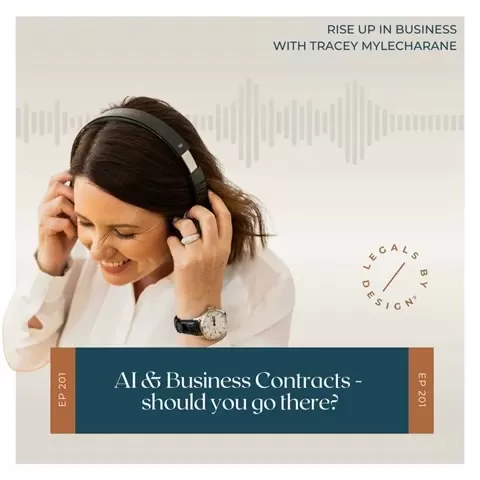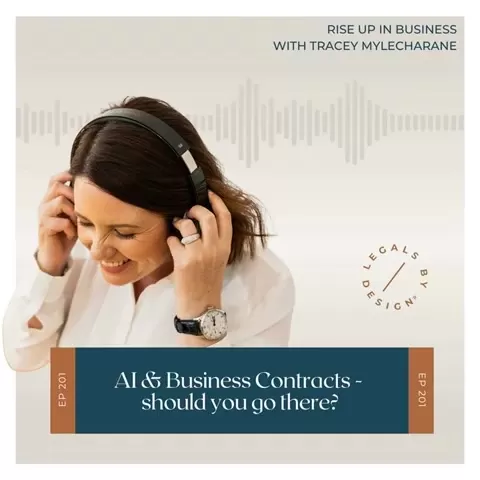AI-Generated Contracts: A Smart Business Move or Risky Decision?
AI and Business Contracts: Navigating the New Frontier
In today's fast-paced business environment, efficiency and cost-effectiveness are more crucial than ever. Artificial Intelligence (AI) is often presented as a tool to streamline business operations, including the creation of legal documents like contracts. But is it wise to trust AI with such critical business elements? Tracey Mylecharane, a legal expert, offers a deep dive into the use of AI for contract creation, discussing both the potential advantages and the serious risks that small business owners should be aware of. This guide aims to help you make well-informed decisions about integrating AI into your legal processes.
Key Insights
AI's Expanding Role
AI's presence in the business world is growing, making it essential to grasp both its capabilities and its limitations.
Contract Risks
Utilizing AI for contract creation involves risks concerning legal accuracy, maintaining brand consistency, and protecting data privacy.
Benefits of Brainstorming
AI can be a helpful tool for brainstorming and generating content ideas, but it requires vigilant oversight when applied to legal contexts.
CRM Solutions
Customer Relationship Management (CRM) systems often provide a more secure and compliant way to automate contracts.
The Need for Professional Review
Legal documents must be meticulously reviewed by a licensed legal professional to ensure their security and compliance.
Data Security Concerns
Entering client data into AI systems can lead to privacy breaches, posing a significant risk.
Clickwrap Agreements
Clickwrap agreements can offer legal contract protections for websites, ensuring user consent to terms.
Understanding Your Needs
Before using AI for contract assistance, it's crucial to know specific clauses and legal requirements relevant to your business.
The Rise of AI in Business Contracts
AI: A Permanent Fixture
Whether you're a fan or not, AI is here to stay. It's better to embrace it and learn how to leverage it effectively, or decide it's not suitable for your business. When we mention AI in this context, we're focusing on Generative AI, like ChatGPT and Claude AI. These tools offer amazing capabilities, but they also require careful consideration, especially in legal applications.

The legal industry is beginning to adopt AI, but much of the output still needs to be thoroughly vetted by legal professionals who are current with legislative changes.
Plagiarism vs. AI
While AI isn't a new concept, its use has surged recently with people using online tools to generate content. The big question is whether this content is original or merely scraped from other sources. It's vital to ensure the content is legally obtained and not plagiarized, which also applies to images that can be copyrighted. Although AI doesn't reveal its sources, you're still responsible for ensuring the legality of the content.
Generative and Anthropic AI
In the realm of business contracts, we're mainly talking about generative and Anthropic AI, such as ChatGPT and Claude AI. These tools can generate text, answer questions, and draft documents. However, they should be approached with caution, especially in legal contexts. Generative AI uses previously sourced content, making it challenging to trace the origin of the information provided.

AI and Your Business Contracts: The Big Question
Should AI Draft Contracts?
Tracey firmly advises against using AI to draft contracts. AI's knowledge base is typically about 18 months behind, which is a significant issue for legal accuracy. Additionally, AI-generated contracts often lack the nuance and brand-specific language needed. If you're not familiar with the necessary clauses and legal requirements, relying on AI could lead to using incorrect or irrelevant data. Tracey suggests using templates as a starting point but stresses the importance of having any AI-generated contract reviewed by a legal expert.
AI's Role in Contract Assessment
Tracey acknowledges some positive feedback on using AI to assess contracts, but emphasizes the need to redact sensitive data first. You can then ask targeted questions about the contract's content, such as warranties or termination processes. However, AI should not be the final authority on these matters, as there's always the risk of missing critical details.
Weighing the Pros and Cons of AI in Business Contracts
Pros
- Increased efficiency in certain tasks
- Reduced costs in initial contract creation
- Help in generating content ideas
Cons
- Potential legal inaccuracies and compliance issues
- Risk of breaching privacy laws and confidentiality
- Inability to address specific business needs
- Lack of brand voice
Frequently Asked Questions About AI and Business Contracts
What is a Clickwrap Agreement?
A clickwrap agreement is a set of terms and conditions that a user agrees to by clicking a box on a website before completing a transaction. Ensuring these terms are legally sound is crucial for protecting your business.
Why is Compliance with Privacy Laws Important?
Non-compliance with privacy laws can lead to substantial fines and damage to your business's reputation. Properly tailored contracts and internal processes are essential for protecting client data.
What Data Laws Should I Know in Australia?
Key data laws in Australia include:
- The Privacy Act 1988
- The Australian Privacy Principles (APPs)
- The Notifiable Data Breaches (NDB) scheme
- Spam Act 2003
- Do Not Call Register Act 2006
Related Questions
Do You Review Employment Contracts?
Tracey confirms that she reviews employment contracts and provides reliable advice. She notes that employment law is constantly evolving, making it essential to keep contracts up to date. She also drafts employment and contractor agreements, offering advice on superannuation and remote work provisions.
Related article
 Best AI Tools for Creating Educational Infographics – Design Tips & Techniques
In today's digitally-driven educational landscape, infographics have emerged as a transformative communication medium that converts complex information into visually appealing, easily understandable formats. AI technology is revolutionizing how educa
Best AI Tools for Creating Educational Infographics – Design Tips & Techniques
In today's digitally-driven educational landscape, infographics have emerged as a transformative communication medium that converts complex information into visually appealing, easily understandable formats. AI technology is revolutionizing how educa
 Topaz DeNoise AI: Best Noise Reduction Tool in 2025 – Full Guide
In the competitive world of digital photography, image clarity remains paramount. Photographers at all skill levels contend with digital noise that compromises otherwise excellent shots. Topaz DeNoise AI emerges as a cutting-edge solution, harnessing
Topaz DeNoise AI: Best Noise Reduction Tool in 2025 – Full Guide
In the competitive world of digital photography, image clarity remains paramount. Photographers at all skill levels contend with digital noise that compromises otherwise excellent shots. Topaz DeNoise AI emerges as a cutting-edge solution, harnessing
 Master Emerald Kaizo Nuzlocke: Ultimate Survival & Strategy Guide
Emerald Kaizo stands as one of the most formidable Pokémon ROM hacks ever conceived. While attempting a Nuzlocke run exponentially increases the challenge, victory remains achievable through meticulous planning and strategic execution. This definitiv
Comments (9)
0/200
Master Emerald Kaizo Nuzlocke: Ultimate Survival & Strategy Guide
Emerald Kaizo stands as one of the most formidable Pokémon ROM hacks ever conceived. While attempting a Nuzlocke run exponentially increases the challenge, victory remains achievable through meticulous planning and strategic execution. This definitiv
Comments (9)
0/200
![AndrewGarcía]() AndrewGarcía
AndrewGarcía
 October 4, 2025 at 10:30:39 PM EDT
October 4, 2025 at 10:30:39 PM EDT
AI gerando contratos? Parece prático até alguém processar você por uma cláusula mal redigida 😅 Será que as empresas estão pondo economia acima da segurança jurídica? Um errozinho pode sair caro...


 0
0
![DanielThomas]() DanielThomas
DanielThomas
 September 26, 2025 at 10:30:44 AM EDT
September 26, 2025 at 10:30:44 AM EDT
AI로 계약서 작성한다니...과연 법적 효력이 있을까요? 🤨 분명 시간은 절약되겠지만 문제 생겼을 때 책임 소재가 애매해질 것 같아요. 특히 국제 계약 같은 복잡한 건 아직 인간 변호사가 필요한 시기인 듯!


 0
0
![MichaelMartinez]() MichaelMartinez
MichaelMartinez
 August 26, 2025 at 5:01:20 PM EDT
August 26, 2025 at 5:01:20 PM EDT
AI contracts sound cool, but I'm skeptical—can a machine really nail all the legal nuances? I’d rather have a human double-check than risk a costly mistake! 😅


 0
0
![JimmyKing]() JimmyKing
JimmyKing
 July 30, 2025 at 9:41:20 PM EDT
July 30, 2025 at 9:41:20 PM EDT
AI contracts sound cool, but I’m wondering if they’re too perfect. Like, can they really catch all the legal nuances humans might miss? Still, saving time on drafting sounds tempting! 😎


 0
0
![JimmyGarcia]() JimmyGarcia
JimmyGarcia
 May 21, 2025 at 7:30:06 AM EDT
May 21, 2025 at 7:30:06 AM EDT
Essa ferramenta de geração de contratos com IA parece promissora, mas fico com medo de erros. Será que vale a pena confiar nela para contratos importantes? Acho que seria bom se tivesse uma revisão humana opcional.


 0
0
![StevenGreen]() StevenGreen
StevenGreen
 May 21, 2025 at 1:19:47 AM EDT
May 21, 2025 at 1:19:47 AM EDT
¡Vaya, esto es muy interesante! La idea de usar IA para generar contratos es genial, pero también da un poco de miedo que algo salga mal. Lo ideal sería una combinación de IA y humano para garantizar seguridad.


 0
0
AI and Business Contracts: Navigating the New Frontier
In today's fast-paced business environment, efficiency and cost-effectiveness are more crucial than ever. Artificial Intelligence (AI) is often presented as a tool to streamline business operations, including the creation of legal documents like contracts. But is it wise to trust AI with such critical business elements? Tracey Mylecharane, a legal expert, offers a deep dive into the use of AI for contract creation, discussing both the potential advantages and the serious risks that small business owners should be aware of. This guide aims to help you make well-informed decisions about integrating AI into your legal processes.
Key Insights
AI's Expanding Role
AI's presence in the business world is growing, making it essential to grasp both its capabilities and its limitations.
Contract Risks
Utilizing AI for contract creation involves risks concerning legal accuracy, maintaining brand consistency, and protecting data privacy.
Benefits of Brainstorming
AI can be a helpful tool for brainstorming and generating content ideas, but it requires vigilant oversight when applied to legal contexts.
CRM Solutions
Customer Relationship Management (CRM) systems often provide a more secure and compliant way to automate contracts.
The Need for Professional Review
Legal documents must be meticulously reviewed by a licensed legal professional to ensure their security and compliance.
Data Security Concerns
Entering client data into AI systems can lead to privacy breaches, posing a significant risk.
Clickwrap Agreements
Clickwrap agreements can offer legal contract protections for websites, ensuring user consent to terms.
Understanding Your Needs
Before using AI for contract assistance, it's crucial to know specific clauses and legal requirements relevant to your business.
The Rise of AI in Business Contracts
AI: A Permanent Fixture
Whether you're a fan or not, AI is here to stay. It's better to embrace it and learn how to leverage it effectively, or decide it's not suitable for your business. When we mention AI in this context, we're focusing on Generative AI, like ChatGPT and Claude AI. These tools offer amazing capabilities, but they also require careful consideration, especially in legal applications.

The legal industry is beginning to adopt AI, but much of the output still needs to be thoroughly vetted by legal professionals who are current with legislative changes.
Plagiarism vs. AI
While AI isn't a new concept, its use has surged recently with people using online tools to generate content. The big question is whether this content is original or merely scraped from other sources. It's vital to ensure the content is legally obtained and not plagiarized, which also applies to images that can be copyrighted. Although AI doesn't reveal its sources, you're still responsible for ensuring the legality of the content.
Generative and Anthropic AI
In the realm of business contracts, we're mainly talking about generative and Anthropic AI, such as ChatGPT and Claude AI. These tools can generate text, answer questions, and draft documents. However, they should be approached with caution, especially in legal contexts. Generative AI uses previously sourced content, making it challenging to trace the origin of the information provided.

AI and Your Business Contracts: The Big Question
Should AI Draft Contracts?
Tracey firmly advises against using AI to draft contracts. AI's knowledge base is typically about 18 months behind, which is a significant issue for legal accuracy. Additionally, AI-generated contracts often lack the nuance and brand-specific language needed. If you're not familiar with the necessary clauses and legal requirements, relying on AI could lead to using incorrect or irrelevant data. Tracey suggests using templates as a starting point but stresses the importance of having any AI-generated contract reviewed by a legal expert.
AI's Role in Contract Assessment
Tracey acknowledges some positive feedback on using AI to assess contracts, but emphasizes the need to redact sensitive data first. You can then ask targeted questions about the contract's content, such as warranties or termination processes. However, AI should not be the final authority on these matters, as there's always the risk of missing critical details.
Weighing the Pros and Cons of AI in Business Contracts
Pros
- Increased efficiency in certain tasks
- Reduced costs in initial contract creation
- Help in generating content ideas
Cons
- Potential legal inaccuracies and compliance issues
- Risk of breaching privacy laws and confidentiality
- Inability to address specific business needs
- Lack of brand voice
Frequently Asked Questions About AI and Business Contracts
What is a Clickwrap Agreement?
A clickwrap agreement is a set of terms and conditions that a user agrees to by clicking a box on a website before completing a transaction. Ensuring these terms are legally sound is crucial for protecting your business.
Why is Compliance with Privacy Laws Important?
Non-compliance with privacy laws can lead to substantial fines and damage to your business's reputation. Properly tailored contracts and internal processes are essential for protecting client data.
What Data Laws Should I Know in Australia?
Key data laws in Australia include:
- The Privacy Act 1988
- The Australian Privacy Principles (APPs)
- The Notifiable Data Breaches (NDB) scheme
- Spam Act 2003
- Do Not Call Register Act 2006
Related Questions
Do You Review Employment Contracts?
Tracey confirms that she reviews employment contracts and provides reliable advice. She notes that employment law is constantly evolving, making it essential to keep contracts up to date. She also drafts employment and contractor agreements, offering advice on superannuation and remote work provisions.
 Best AI Tools for Creating Educational Infographics – Design Tips & Techniques
In today's digitally-driven educational landscape, infographics have emerged as a transformative communication medium that converts complex information into visually appealing, easily understandable formats. AI technology is revolutionizing how educa
Best AI Tools for Creating Educational Infographics – Design Tips & Techniques
In today's digitally-driven educational landscape, infographics have emerged as a transformative communication medium that converts complex information into visually appealing, easily understandable formats. AI technology is revolutionizing how educa
 Topaz DeNoise AI: Best Noise Reduction Tool in 2025 – Full Guide
In the competitive world of digital photography, image clarity remains paramount. Photographers at all skill levels contend with digital noise that compromises otherwise excellent shots. Topaz DeNoise AI emerges as a cutting-edge solution, harnessing
Topaz DeNoise AI: Best Noise Reduction Tool in 2025 – Full Guide
In the competitive world of digital photography, image clarity remains paramount. Photographers at all skill levels contend with digital noise that compromises otherwise excellent shots. Topaz DeNoise AI emerges as a cutting-edge solution, harnessing
 Master Emerald Kaizo Nuzlocke: Ultimate Survival & Strategy Guide
Emerald Kaizo stands as one of the most formidable Pokémon ROM hacks ever conceived. While attempting a Nuzlocke run exponentially increases the challenge, victory remains achievable through meticulous planning and strategic execution. This definitiv
Master Emerald Kaizo Nuzlocke: Ultimate Survival & Strategy Guide
Emerald Kaizo stands as one of the most formidable Pokémon ROM hacks ever conceived. While attempting a Nuzlocke run exponentially increases the challenge, victory remains achievable through meticulous planning and strategic execution. This definitiv
 October 4, 2025 at 10:30:39 PM EDT
October 4, 2025 at 10:30:39 PM EDT
AI gerando contratos? Parece prático até alguém processar você por uma cláusula mal redigida 😅 Será que as empresas estão pondo economia acima da segurança jurídica? Um errozinho pode sair caro...


 0
0
 September 26, 2025 at 10:30:44 AM EDT
September 26, 2025 at 10:30:44 AM EDT
AI로 계약서 작성한다니...과연 법적 효력이 있을까요? 🤨 분명 시간은 절약되겠지만 문제 생겼을 때 책임 소재가 애매해질 것 같아요. 특히 국제 계약 같은 복잡한 건 아직 인간 변호사가 필요한 시기인 듯!


 0
0
 August 26, 2025 at 5:01:20 PM EDT
August 26, 2025 at 5:01:20 PM EDT
AI contracts sound cool, but I'm skeptical—can a machine really nail all the legal nuances? I’d rather have a human double-check than risk a costly mistake! 😅


 0
0
 July 30, 2025 at 9:41:20 PM EDT
July 30, 2025 at 9:41:20 PM EDT
AI contracts sound cool, but I’m wondering if they’re too perfect. Like, can they really catch all the legal nuances humans might miss? Still, saving time on drafting sounds tempting! 😎


 0
0
 May 21, 2025 at 7:30:06 AM EDT
May 21, 2025 at 7:30:06 AM EDT
Essa ferramenta de geração de contratos com IA parece promissora, mas fico com medo de erros. Será que vale a pena confiar nela para contratos importantes? Acho que seria bom se tivesse uma revisão humana opcional.


 0
0
 May 21, 2025 at 1:19:47 AM EDT
May 21, 2025 at 1:19:47 AM EDT
¡Vaya, esto es muy interesante! La idea de usar IA para generar contratos es genial, pero también da un poco de miedo que algo salga mal. Lo ideal sería una combinación de IA y humano para garantizar seguridad.


 0
0





























